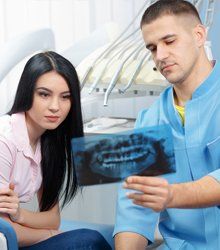Known risks and complications
The removal of wisdom teeth is a common procedure that usually produces few, if any, serious complications. However as with any surgical procedure, you should be aware of the following possible complications and discuss them with your oral and maxillofacial surgeon before consenting to surgery.
If you have any questions or concerns about a recent surgery performed by Dr. Ronald P. Martin, or an upcoming procedure you have scheduled, please call our office. Our staff is happy to assist you with anything you need.

Risks and complications associated with any oral surgery
Infection
Any time surgery is performed, there is a slight chance of infection setting in afterwards. Any infection should be taken seriously and reported to your oral and maxillofacial surgeon, who will prescribe appropriate antibiotics to treat the problem. Signs of infection include fever, abnormal swelling and pain, salty or prolonged bad taste, and pus formation.
Injury
Adjacent teeth, filling material or bridge work may be in close proximity to the wisdom teeth and can suffer damage during extraction.
Dry Socket
This term is used to describe a condition that can develop in the empty tooth socket when normal blood clotting is disturbed following surgery. If a blood clot prematurely dissolves or does not form properly in the socket, for example due to smoking or food impaction, the socket remains "dry" for a period of time and heals more slowly than usual. A dry socket can be quite painful because it leaves the bone within the socket exposed to air, food and fluids. If you experience such increased pain a few days following surgery, contact your surgeon. Steps can be taken to reduce discomfort while healing takes place.
Numbness or Altered Sensation
In some cases major sensory nerves serving the mouth are located in close proximity to wisdom teeth, and it is possible that one or more of these nerves could be irritated during surgery. If this happens, you could experience altered or total loss of feeling in the areas served by the nerve. This numbness or altered sensation can affect the lip, tongue, cheek, chin, gums or teeth, depending on the nerve that is involved. Numbness beyond the first 24 hours in any location is rare and usually temporary, but may be permanent
Sinus Complications
Sometimes upper wisdom teeth are near the large maxillary sinus, and the roots may even penetrate into the sinus cavity. An opening into the sinus may occur, but will typically heal without incident. While rare, drainage or sinus pain may occur following tooth removal. If these complications develop, contact your oral and maxillofacial surgeon.
Root Fragments
Occasionally roots are extremely long or fragile, and a piece of root may break off during surgery. Typically the fragment is removed, but if it is close to a nerve or the sinus cavity, or if its removal would jeopardize adjacent teeth, the surgeon may decide to leave the fragment in place. This rarely presents long-term problems, and the fragment can be monitored with x-rays.
Jaw Fracture
In very rare cases, the removal of wisdom teeth can weaken the jawbone, particularly if the jaw is thin and the teeth are severely impacted. If a fracture occurs, x-rays will reveal the location of the fracture, and your oral and maxillofacial surgeon can treat the problem. Care should be taken to avoid eating hard, crunchy foods that place undue stress on the jaws until healing is completed.
TMJ
Jaw-joint pain or abnormal function is rare following wisdom tooth removal, but if it does occur, further treatment may be necessary. Prior to surgery, be sure to inform your oral and maxillofacial surgeon about any pre-existing problems with the TMJ.

Schedule an appointment
Hours:
- Monday
- Closed
- Tue - Thu
- -
- Friday
- -
- Sat - Sun
- Closed
Closed 12:30 PM - 2:00 PM for lunch
Ronald P. Martin, D.M.D., P.C.
125 Eagle's Pointe Pkwy, Ste. 100
Stockbridge, GA 30281
Most types of insurance are accepted. Contact our office for participating plan and pricing information.
Hours:
- Monday
- Closed
- Tue - Thu
- -
- Friday
- -
- Sat - Sun
- Closed
Closed 12:30 PM - 2:00 PM for lunch
Memberships:
- Georgia Dental Association™
- American Dental Association™
- American Board of Oral and Maxillofacial Surgery™
- Georgia Society of Oral and Maxillofacial Surgeons™
Awards:
- D.M.D. Degree from Medical College of Georgia
- Board Certification from the American Board of Oral and Maxillofacial Surgery

